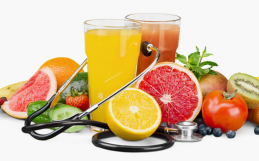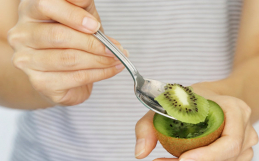Is eating fruit fattening?
Usually, when following a diet for weight control, the first recommendation is to limit the consumption of simple sugars (e.g. table sugar or sucrose, fructose from fruit and juices, honey glucose and milk lactose, which should represent a maximum of 10-15% of the total share of daily carbohydrates), preferring instead complex carbohydrates (e.g. pasta, bread, whole grains, etc.). At this point, the most common mistake is to begin to eschew sugars, even those of fresh fruit, up to reaching, in the most extreme cases, the total elimination of all types of sugar, thus giving up the benefits of fruit in everyday life. In doing so, however, many precious micro-nutrients are lost that are instead excellent allies in weight control and that, above all, allow us to maintain ourselves in good health.
The advice is, therefore, not to abolish fruit from the diet.
To eat fruit without gaining weight, just follow two simple rules:
- Eat the fruit by portioning it, about two portions a day of 150 g, net of scrap;
- Favour the most watery fruits, as they are less sugary.
The Jingold kiwi is a very watery fruit (about 85% of its weight is represented by water), therefore, its sugar content is low and, moreover, it contains a great deal of fibre, which is good not only for the intestines, but also has a satiating effect useful in case of diets aimed at weight loss. What’s more, it has very few calories: 100 g of Jingold green kiwi contains only 44 kcal.
Kiwi and laxative properties
Despite having a sweet scent and taste, especially if ripe, you should not be afraid of eating two kiwis a day. The high content of water and fibre will help, in fact, to maintain the sense of satiety, very useful for those who tend to eat between meals, and to promote intestinal transit. When following a diet aimed at losing weight, in fact, one of the first side effects is the onset of constipation.
- Eating two Jingold kiwis a day ensures proper hydration and contributes, together with vegetables and whole grains from meals, to reaching the daily fibre requirement (about 30 g per day). In this article we have described all the benefits of Jingold kiwis against constipation.
Polyphenols of the kiwi
We often hear about them, but what are these famous “polyphenols”?
- Polyphenols are the most represented antioxidant molecules of the plant kingdom. These are molecules that can protect the body from the harmful action of free radicals, i.e. particles that accelerate the ageing processes. Polyphenols abound especially in fresh fruit, such as Jingold kiwis.
- Polyphenols offer several beneficial effects, including being an antioxidant, counteracting the oxidative and pro-inflammatory state typical of obesity. For this reason, the intake of many polyphenols can help in reducing the physiological weight gain that occurs with the passage of time.
- Remember that even a moderate increase in BMI (Body Mass Index) and abdominal circumference, over time, induces a significant increase in the risk of disease, especially cardiovascular disease.
In addition, some studies have shown that polyphenols can induce an increase in total energy expenditure, an increase in the consumption of glucose (blood sugar) in skeletal muscle and a reduction in glucose in adipose tissue (fat), preventing obesity.
Vitamins of the kiwi
Eating two Jingold kiwis a day allows you to meet your daily requirement for vitamin C, i.e. 80 mg in adult women and 90 mg in adult men (reference values for the EFSA 2019 diet). The amount of vitamin C contained in 100 g of Jingold green kiwi is, in fact, equal to 85 g, higher than that contained, for example, in oranges (49 mg in 100 g of food) or lemons (50 mg in 100 g).
- Vitamin C is essential for the health of our body as it performs several important functions, first of all being among the main compounds with antioxidant activities. In addition, it helps to increase the absorption of iron in vegetables (not haem) and can affect the absorption of calcium, factors that are extremely important for those who follow a plant-based diet.
- Recent research has shown that kiwis, especially the gold variety (Jingold gold kiwi), can increase the absorption and retention in the body of essential minerals in the diet, especially iron, calcium, phosphorus and magnesium. This role is also played by vitamin E, also contained in Jingold kiwis (in the seeds), although in lower quantities than vitamin C.
In addition, two Jingold kiwis per day (about 150 g) meet almost 100% (86%) of the estimated average daily requirement (AI) for the Italian adult population of another important micro-nutrient: vitamin K (EFSA 2019).
- Vitamin K is involved in blood clotting processes and has the characteristic of being fat-soluble, that is, it dissolves in fats.
Therefore, to absorb it, it is always necessary to associate it with a fat source from a food, such as dried fruit (walnuts, almonds, hazelnuts, pistachios, etc.) or whole yoghurt.
Mineral salts of the kiwi
The Jingold kiwi contains, in addition to vitamins, also many important mineral salts: potassium, magnesium, phosphorus and iron.
- Potassium, in particular, acting in synergy with vitamin C and the polyphenols contained in Jingold kiwis, contributes to the health of the arteries by reducing the risk of atherosclerotic plaque formation and decreasing the triglyceride levels in the blood.
- The potassium content of Jingold kiwis, moreover, is higher than that of bananas: 600 μg in 150 g of fruit, while bananas provide 525 μg in the same amount.
Effects of the kiwi on the heart and on blood pressure
The data available to date, taken from authoritative scientific studies, show that the daily consumption of kiwi is related to the improvement of lipid profiles in the blood, thus reducing cardiovascular risk.
- Even more encouraging results were obtained with the gold kiwi variant: the intake of two gold kiwis every day for six weeks led the overweight and obese patients subject of the study to a greater reduction in fat mass, an improvement in inflammatory parameters and cardiovascular risk indicators.
- A further study showed that in men and women with moderately elevated blood pressure, the consumption of three kiwis per day was associated with a lower systolic and diastolic blood pressure in 24 hours compared to the consumption of one apple per day.
For all these reasons, Jingold kiwis should be considered as part of a natural and effective dietary strategy to address some of the main concerns for health and well-being around the world, as they are useful in the slimming diet thanks to their laxative and anti-inflammatory properties, as well as for their protective function of the cardiovascular system given by vitamins and minerals contained in the fruit.
Scientific collaboration: Dott.ssa Raffaella Cancello, Nutritional Researcher, Department of Medical Sciences and Rehabilitation specialised in endocrine-metabolic disorders, Research Laboratory in Nutrition and Obesity, IRCCS-Istituto Auxologico Italiano (Scientific Institute for Research, Hospitalisation and Health Care), Milan
Essential bibliography:
- Yang HY, Wang WH, Zhan JY, Huang YL, Cheng WY. Beneficial Effects of Golden Kiwifruit Consumption in Overweight and Obese Young Adults. J Nutr Sci Vitaminol (Tokyo). 2020;66(Supplement):S356-S360. doi: 10.3177/jnsv.66.S356. PMID: 33612624.
- Svendsen M, Tonstad S, Heggen E, Pedersen TR, Seljeflot I, Bøhn SK, Bastani NE, Blomhoff R, Holme IM, Klemsdal TO. The effect of kiwifruit consumption on blood pressure in subjects with moderately elevated blood pressure: a randomized, controlled study. Blood Press. 2015 Feb;24(1):48-54. doi: 10.3109/08037051.2014.976979. Epub 2014 Dec 8. PMID: 25483553.
- Recio-Rodriguez JI, Gomez-Marcos MA, Patino-Alonso MC, Puigdomenech E, Notario-Pacheco B, Mendiza-bal-Gallastegui N, de la Fuente Ade L, Otegui-Ilarduya L, Maderuelo-Fernandez JA, de Cabo Laso A, Agu-do-Conde C, Garcia-Ortiz L, Group E. 2015. Effects of kiwi consumption on plasma lipids, fibrinogen and insulin resistance in the context of a normal diet. Nutr J 14:97.
- Ma T, Sun X, Zhao J, You Y, Lei Y, Gao G, Zhan J. 2017. Nutrient compositions and antioxidant capacity of kiwifruit (Actinidia) and their relationship with flesh color and commercial value. Food Chem 218: 294–304.
- He M, Zeng J, Zhai L, Liu Y, Wu H, Zhang R, Li Z, Xia E. Effect of in vitro simulated gastrointestinal digestion on polyphenol and polysaccharide content and their biological activities among 22 fruit juices. Food Res Int. 2017 Dec;102:156-162. doi: 10.1016/j.foodres.2017.10.001. Epub 2017 Oct 2. PMID: 29195935.






